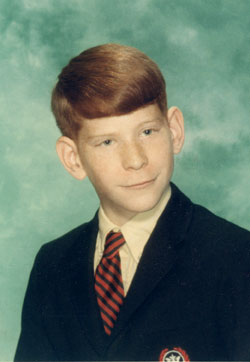Musical Moksha for Two Dollars

Michael Robinson sixth grade graduation photo
While working at Patelson's in Manhattan, behind Carnegie Hall, there was considerable excitement when the first classical CDs came into Darton Records, situated inside the music shop. At the time, I consulted with an audio expert wondering if we would be able to personally record onto CDs similar to cassette tapes. He assured me this would never be possible! Of course, we now have CDRs, the finest ones estimated to last over 300 years. I especially love the loop play feature, and ability to instantly move to any track using remote control afforded by CDs and CDRs. Funded by the National Endowment for the Humanities, the Ethnomusicology Department at UCLA, the first of its kind in America, founded by Nazir Ali Jairazbhoy, gave me a one-year appointment, extended an additional year, to transfer rare field recordings from various countries onto CDR. Regarding cassette tapes, they became the primary medium for studying recordings of Indian classical music. The hour-long drive each way to Little India on the outskirts of Los Angeles county became a regular pilgrimage of great joy and excitement, wondering what musical treasures awaited me in the form of cassette tapes from India. Sold in little shops mostly with video tapes of Bollywood films, were immortal recordings of Shivkumar Sharma, Pandit Jasraj, Hariprasad Chaurasia, Bhimsen Joshi, Ravi Shankar and others priced at two to three dollars each. There is also chai, Indian sweets, and the finest Indian cuisine to relish in the magical place named Artesia, though cassette tapes of Indian masters are no longer available. I hope the various mediums of recorded music remain with us. They all possess unique virtues. Music is so ethereal in nature absent of live performances, we instinctively yearn for some physical contact that CDs and cassette tapes afford, including images of the artists and synergistic liner notes. LPs, too, even though I personally have not returned to that deservingly honored format. A momentous disconnect between quality, value and money my title suggests recalls how Haridas tossed a sack of priceless gems into a rushing stream, rejecting Akbar the Great's offer to hear him sing, Tansen explaining to the monarch how his teacher only sang for God, living alone in the forest. - Michael Robinson, August 2022, Los Angeles
© 2022 Michael Robinson All rights reserved
Michael Robinson is a Los Angeles-based composer, programmer, jazz pianist and musicologist. His 180 albums include 151 albums for meruvina and 29 albums of piano improvisations. Robinson has been a lecturer at UCLA, Bard College and California State University Long Beach and Dominguez Hills.
|